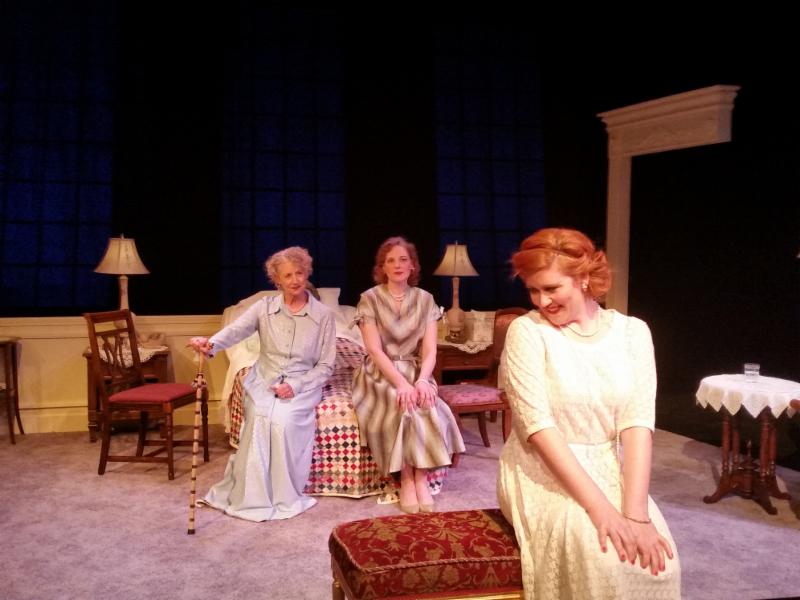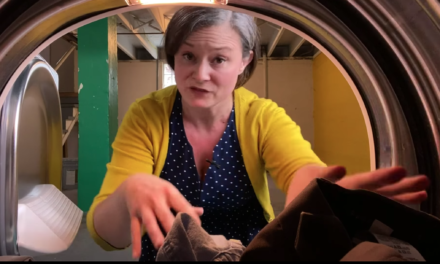Rena Cherry Brown, Mia Seitz, & Carrie Cook Ketterman in Three Tall Women. Photo courtesy of Bunbury Theatre.
Three Tall Women
By Edward Albee
Directed by Steve Woodring
Review by Keith Waits
Entire contents are copyright © 2017, Keith Waits. All rights reserved.
Playwright Edward Albee made his reputation in the late 1950’s and early 1960’s with work that stands among the greatest American plays: Zoo Story, Who’s Afraid of Virginia Wolff? and A Delicate Balance. After what is generally considered a fallow period, he wrote Three Tall Women, a highly significant return to form which won him a 3rd Pulitzer Prize in 1994.
An examination of Albee’s mother, with whom he had a difficult relationship, the first act is an extended scene between an irascible 91-year-old woman (Rena Cherry Brown), her 52-year-old caretaker (Mia Seitz), and a 26-year-old representative from her law firm (Carrie Cook Ketterman). The woman – “A”, is frail, nearly incontinent, and hilariously cranky and combative, the caretaker – “B”, is a tough-as-nails veteran, and they are both annoyed by the young woman – “C”, who seems mostly to be in the way.
Act one is a mixture of character comedy and the kind of oblique drama that is accepted as characteristic of Albee, and at times the production struggles a bit to find a pace that serves both aspects. Otherwise, the work from the cast is closely observed and subtle, and under Steve Woodring’s direction, they navigate the cerebral and complex script with care and intelligence.
Act two moves to Albee’s real purpose, in which the three women are clearly delineated as the same character at different points in her life. Ms. Ketterman shows a young woman looking for commitment but still possessed of an almost naïve innocence; Ms. Seitz captures the tough-as-nails, middle age rebellion against previous life choices; and Ms. Brown finds the resignation of a lifetime’s worth of earned wisdom. It is all too easy to see the character as difficult and unyielding during the first part, but this philosophical deconstruction allows Albee to express understanding and even admiration of a compromised life. Any reading of his biography underscores the powerful reconciliation of the past that is at work here. It also reminds us of Albee’s considerable insight in rendering female characters.
Albee himself becomes a silent presence onstage when a Boy (who is, in fact, an adult) arrives to visit his dying mother. Patrick Vaughn plays the role, a passive character who never speaks, with restraint that makes the one moment of naked emotional expression all the more powerful.
Tom Tutino’s set is subtly evocative of the taste and nature of a woman whose sensibilities were formed in mid-Twentieth Century America, and Holly Jenkins Evans’s costumes make important distinctions in period for each iteration of the woman in act two. It’s a smartly designed production.
Edward Albee is not easy, but he’s important to American theatre, so we must be grateful to Bunbury Theatre for bringing Three Tall Women to us, and Steve Woodring for so carefully shepherding it to the stage.
Three Tall Women
February 17 – March 5, 2017
Bunbury Theatre
At The Henry Clay Theatre
604 South Third Street
Louisville, KY 40202
(502) 585-5306
www.bunburytheatre.org
Keith Waits is a native of Louisville who works at Louisville Visual Art during the days, including being the host of PUBLIC on WXOX-FM 97.1/ ARTxFM.com, but spends most of his evenings indulging his taste for theatre, music and visual arts. His work has appeared in Pure Uncut Candy, TheatreLouisville, and Louisville Mojo. He is now Managing Editor for Arts-Louisville.com.





